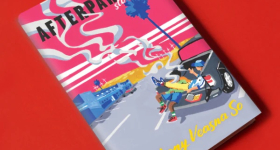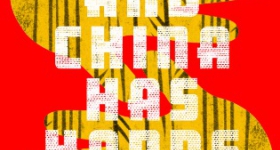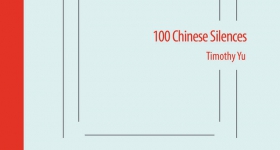Excerpted from Everything Here Is Beautiful, published by Pamela Dorman Books/Viking, an imprint of Penguin Random House LLC. Copyright (c) Mira T. Lee, 2018.
MIRANDA
Lucia said she was going to marry a one-armed Russian Jew. It came as a shock, this news, as I had met him only once before, briefly, when I was in town for a meeting with a pair of squat but handsome attorneys. His name was Yonah. He owned a health food store in the East Village, down the street from a tattoo parlor, across from City Video, next door to a Polish diner, beneath three floors of apartments that Lucia said he rented out to the yuppies who would soon take over the neighborhood. He had offered me tea, and I took peppermint green, and he scurried around, mashing Swiss chard and kale in a loud, industrial blender, barking orders to his nephews, or maybe they were second or third cousins (I never knew, there were so many), because they were sluggish in their work of unloading organic produce off the delivery trucks. He yelled often. I thought, This Yonah is quite a rough man.
He dusted the wine, mopped the floor, restocked packages of dried figs and goji berries and ginseng snacks on the shelves. He was industrious, I could see, intent on making his fortune as immigrants do. Lucia said he played chess. I’d never known my sister to play chess, though she was always excellent at puzzles as a child. Yonah didn’t seem to me the kind to play chess either, nor to drink sulfite-free organic wine or eat goji berries. But as they say, love is strange. And I wouldn’t begrudge my sister love, nor any stranger, not even one who smoked and was the kind of man who looked disheveled even fresh after a shower and would leave his camo briefs lying around on the bathroom floor. I admit I was disturbed, creeped out, by his prosthetic arm, which he wore sometimes, though more often I’d find it sitting by itself in a chair.
Lucia brought him to visit our mother, who was dying. Our mother was tilted back in a green suede recliner, wrapped in cotton blankets, watching the Three Tenors video we’d given her the previous year. She took a long look at this man — his workingman’s shoulders, his dark-stubbled jaw, his wide, flat nose. Her Yoni had the essence of a duck, Lucia said (endearingly), or maybe a platypus, though she’d never seen one up close. My sister liked to discern people’s animal and vegetable essences. In fact, she was usually right.
Our mother winced as her gaze settled upon his left arm, a pale, peachy shade that did not match the rest of him.
“What happened to your arm?” she said.
“An accident, when I was 21.” He said it quietly but without any shame.
“In Soviet Union?”
“In Israel. I moved there when I was teenager.”
“You are divorced,” she said, and I tried to read his thoughts in the fluttering of his blue-gray eyes. I wondered if Lucia had warned him that our mother was like that. I wondered what had been shared, what omitted, when the two of them exchanged stories over chess, over wine. I wished to say to this man: Do you really think you now know our Lucia?
“Thirteen years,” he said. “I have been divorced for 13 years.” Our mother winced again, though it could’ve been from the pain shooting through her bowels, or her bones, or her chest.
“You are Jewish,” she said. “Jewish are so aggressive. You have children?”
“Two,” he said. “They are with their mother, in Israel.”
At the mention of the other woman, our mother spat. Once, I suppose, she would have wanted to know more, like what did he do, or how old were the children, or what were their names, or did they play musical instruments, and we might have told him that Lucia could recite 20 Chinese poems by the time she was 3, or that she was a real talent on the violin, or that she’d suffered a terrible bout of meningitis at age 6 and nearly died.
“Why are you divorced?” she asked.
“We were married too young,” he said. The skin of his face seemed to hang off his cheekbones. A basset hound, I later said to Lucia.
"This is life,” he said to our mother.
She did not seem quite satisfied with this answer, though she nodded, expelled a heavy sigh. “Take care of my daughter,” she said.
But she was not looking at him. She was looking at me. She fell asleep. Two weeks later, she was gone.
“Three piles,” said Lucia. “Everything in three piles.”
Keep. Salvation Army. Trash.
This was our strategy, tasked as we were with selling the house in New Jersey, as specified by our mother’s will (our childhood home, marred by death, now considered “inauspicious”). So we sorted CorningWare and gas bills and soy sauce and ice trays and Cabbage Patch dolls and garden hoses and yarn and frying pans and Maurice Sendak books and twin bed sheet sets with faded Raggedy Ann and Andy pillowcases. Keep. Trash. Keep. Keep. Salvation Army. Trash. And when we reached Ma’s bedroom, a hallowed hush, as if to acknowledge the finality in this sacred act of disturbance on which we now embarked. The desk where she’d worked, pencil in hand; the throw pillows Lucia sewed one year in home economics class; the portable radio; the clock; her Reader’s Digests; the bed where she’d lain tethered to her morphine drip, eyes closed, silent, body slack at last.
“Fashion show?” whispered Lucia.
“Well … ” Why not?
We peered in the closet, the one we’d raided often as impish children. We picked out two vintage cotton sundresses, one with chevron stripes, the other, zigzags. “Twirl!” said Lucia. “You,” I said, and in unison, our skirts puffed out like upside-down tulips.
We burst into tears. Twelve cycles of chemotherapy, three surgeries, three courses of radiation, two clinical trials, three remissions, four recurrences, over nine grueling years — yet the permanence of Ma’s absence still came as a shock.
We worked until late. At 2 in the morning, we decided to bake. We blasted Abba and Blondie and the Rolling Stones, broke out in song as flour and sugar flew everywhere. “Almonds!” said Lucia. “We need almonds!” Chinese almond cookies were Ma’s favorite, so we set down our spatulas, drove to the 24-hour pharmacy to shop for nuts.
We’ll be roommates someday in an old folks’ home! We’ll be cranky and play bridge and complain to the nurses about our hemorrhoids. Ha ha, when you’re 80 I’ll only be 73!
No doubt the grief made us giddy. The late hour. The fatigue. But it was like that, to be with Lucia.
We fell asleep in the family room, the house buttery warm, the waffle-weave of sofa cushions imprinted on our cheeks. And then morning came. And with it came Yonah, roaring up the driveway in a giant rental truck.










Comments